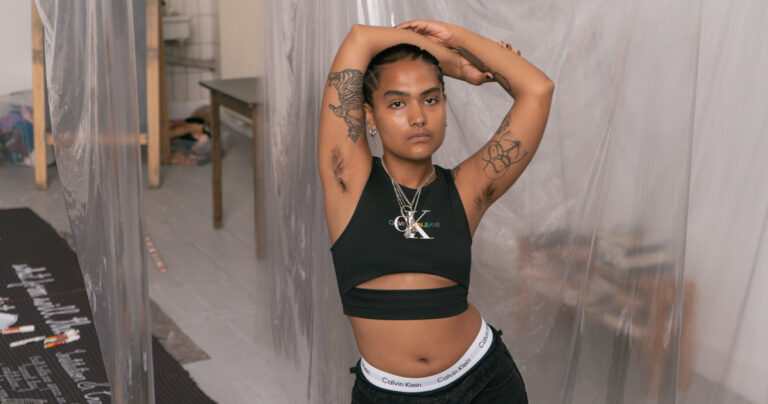Calvin Klein’s ‘Murals of Pride’ celebrates defining moments in the queer and trans journey
It’s 2021, a time when representation is fundamental, especially to marginalised groups and communities. Pride Month may be over, but the importance of giving visibility to those who identify as LGBTQIA+ continues—and what better way to give space and build discourse around marginalised voices than through art?
Introducing Murals of Pride, an initiative by Calvin Klein created in collaboration with the Institute of Digital Fashion (IoDF). As an extension of Calvin Klein’s ongoing support for Pride and LGTBQIA+ communities through its #ProudInMyCalvins campaign, Murals of Pride seeks to celebrate the defining moments in queer and trans journeys. In the initiative, the brand has teamed up with four artists to express their defining moments in the form of murals across four cities including London, Amsterdam, Berlin and Milan. The talents vary in their experience, defining moments and practices but all champion the same global conversation of what Pride means to the queer communities in 2021.
Screen Shot spoke to each icon about their journey and creative niche to break down the translation process from their defining moments into visual art.
Tanaka Fuego, Poet (he/they)
‘Ancestors Encore’ in London (2A Chance Street as of 3 August)
Writer and poet Tanaka Fuego is a multi-published, international spoken word performer. Fuego’s mural features a portion of the poem, named Ancestors Encore, he wrote as a message to his ancestors, giving a voice to the queer black and brown folk who came to the Western world and were forced into public service. “I am giving my space over to them as a celebratory platform for our pride together,” Fuego said.
“I don’t tend to look at poetry over any other mediums [of art]. I’m an artist who appreciates expression in all forms,” Fuego noted, describing how poetry has helped him find a sense of self-identity and belonging in the art form—finding solace in their pen just as much as they’ve had to find comfort in their own vessel. “Something which couldn’t have been achieved if I hadn’t picked up the pen,” Fuego added.
“Writing became my best friend…I was the only one who could define myself and my decisions, and that was the start of really learning what autonomy looked like.”
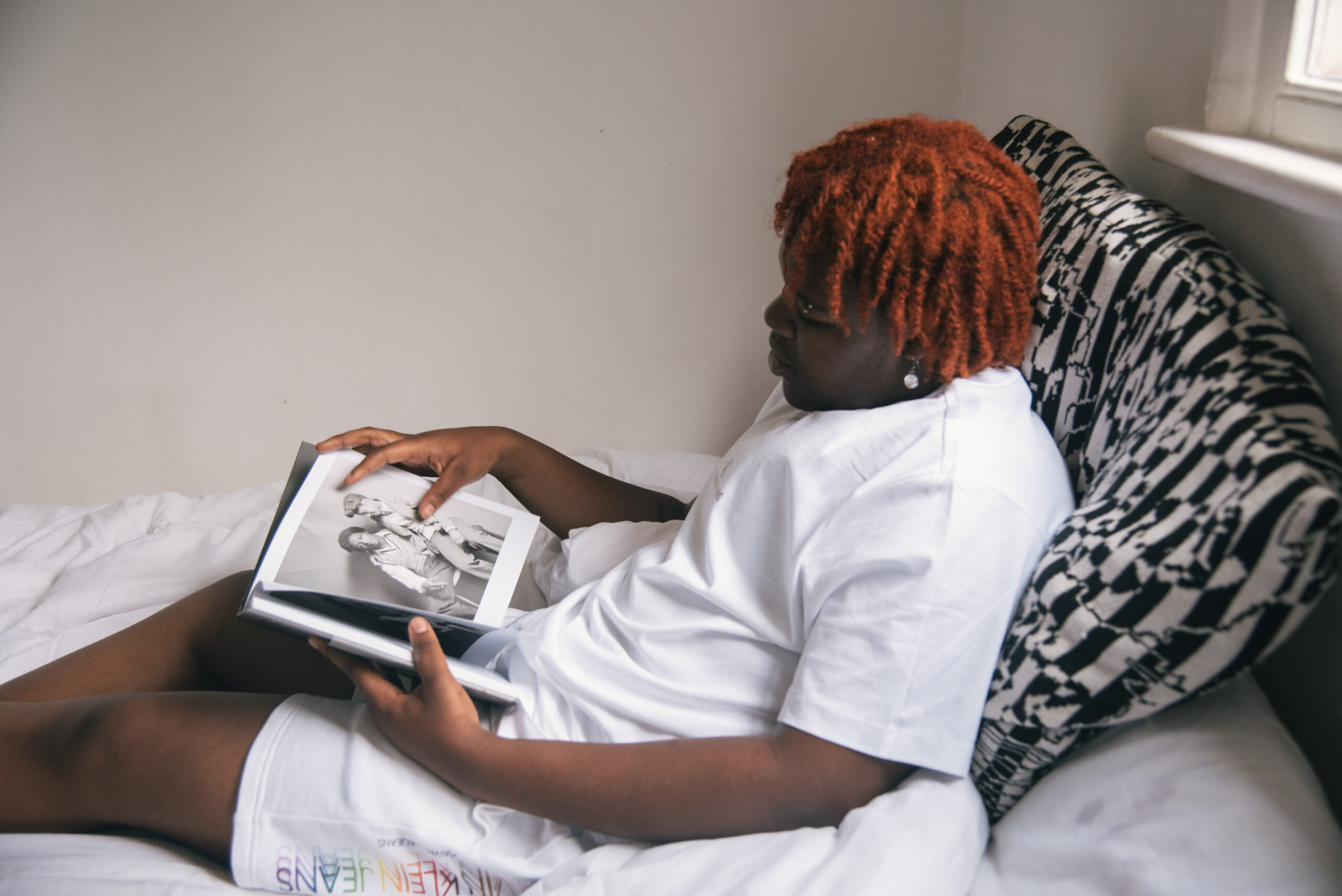
Fuego described poetry as his “consistent aid.” He noted how it allows him to “gain insight and gather passion for himself in times of difficulty.”
The turning point of his identity was when he moved to America from London at the young age of 16. In a completely new environment, he voiced the struggle of finding his own feet. He also admitted how his struggle has, in turn, aided his self-development. “I realised really early on that America wasn’t going to be like the UK,” Fuego reminisced. “There wasn’t that freedom of transportation, there wasn’t going to be outlets such as art right away to help me adjust. I learnt pretty fast what it meant to be black and trans.”
Living in a different country, yet having no friends in the city, allowed Fuego to know sides of himself he “possibly wouldn’t have got to experience.” “My pen wouldn’t know the taste of the ink across an ocean, but how I’ve felt pain across it all,” he added.
For Fuego, it felt beautiful to be a part of the Calvin Klein initiative and to be able to have a space to create as an ode for his people. “I wouldn’t be who I am if not for being black—for being African,” Fuego remarked, explaining how his black heritage and queer identity is intertwined with his poetry.
According to the poet, the poem is called Ancestors Encore as he and his black, queer ancestors have never left the stage. “Only in certain eras did people decided to clap for them,” Fuego said. “I’ve been a constant admirer of those who came before me, in all their blackness and queerness and [still] made a ruckus—in any and every way, even if that meant living [in] stealth, or living out loud. The courage will always and forever be palpable.”
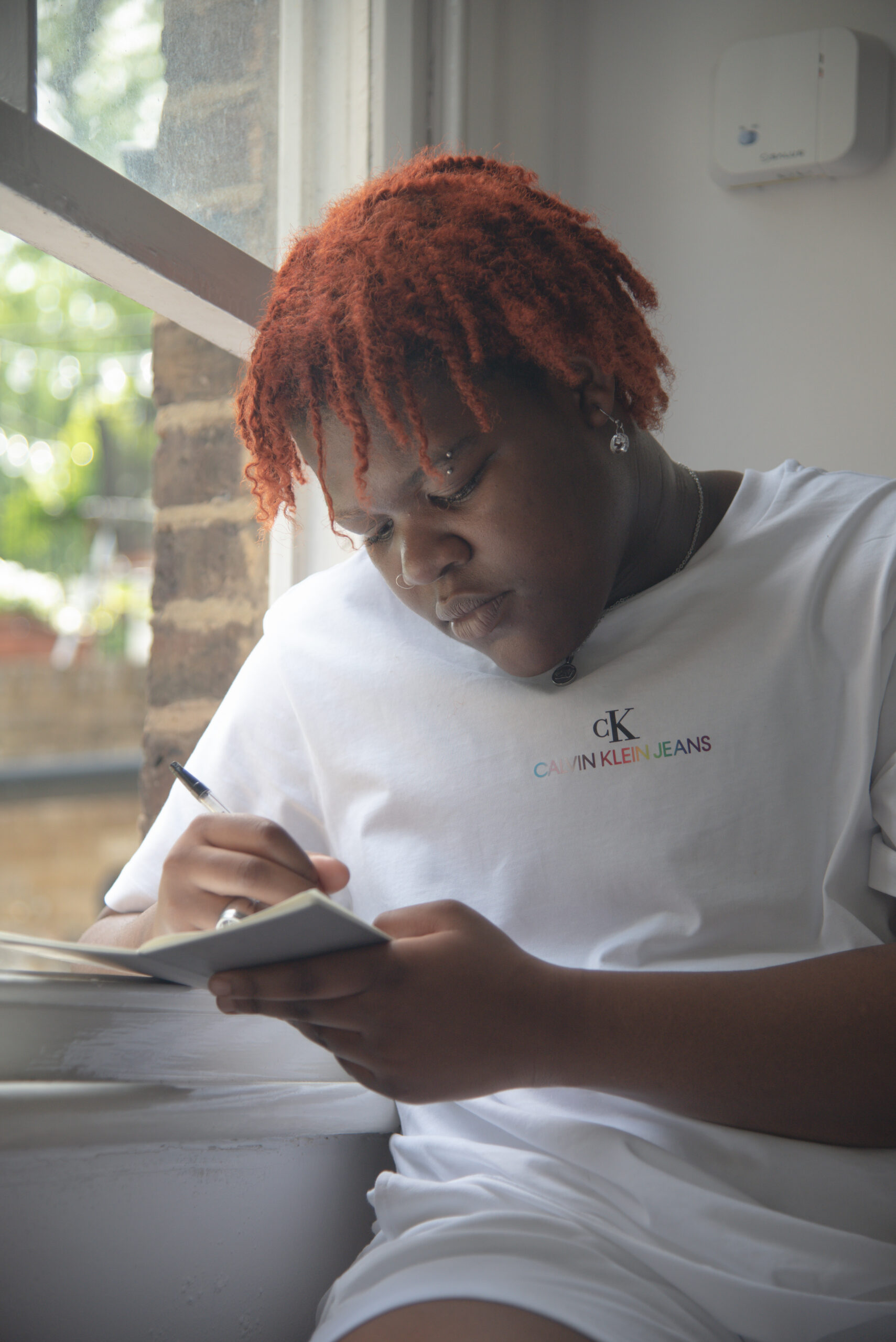
An extract from the poem reads: ‘I am all my ancestors wildest dreams yet made to feel burden’. Fuego described that this line relates to how his life was “offered via sacrifice, even though the secular world may not always appreciate the sacrifices that were made by those before us.” “I am constantly aware that even in the midst of pain, uncertainty and transphobia.” He continued, “I am living a dream. To be able to breathe with these masc lungs, and [to] have access to testosterone. To be loved by those who see me and affirm me. I am living a dream!”
Sarah Naqvi, Artist (she/they)
‘Etymologies of Erasure’ in Amsterdam (Hazenstraat 18 as of 27 July)
Living between Mumbai and Amsterdam, Sarah Naqvi is a contemporary artist whose work covers themes such as gender, sexuality, race, religion and body positivity. Naqvi’s mural represents an imaginary landscape with characters reflecting queer ecologies and erased histories that are essential for queer people and their empowerment. The multidisciplinary mural is a collage of textures, scans, hand-painting and green screens.
Her work depicts a narrative of recognition and remembrance: to be present with the past is to recognise what the future lacks and reminds us of the work that is to be done. Naqvi explained how she aimed to encapsulate “the erased histories we come from and celebrate the forces that fought before us is a moment of pride that I feel true towards.” She continued, “The central figure sat under the tree is an image of me from a time I didn’t recognise myself, and then I am now liberated, imputed digitally and captured in my home environment.”
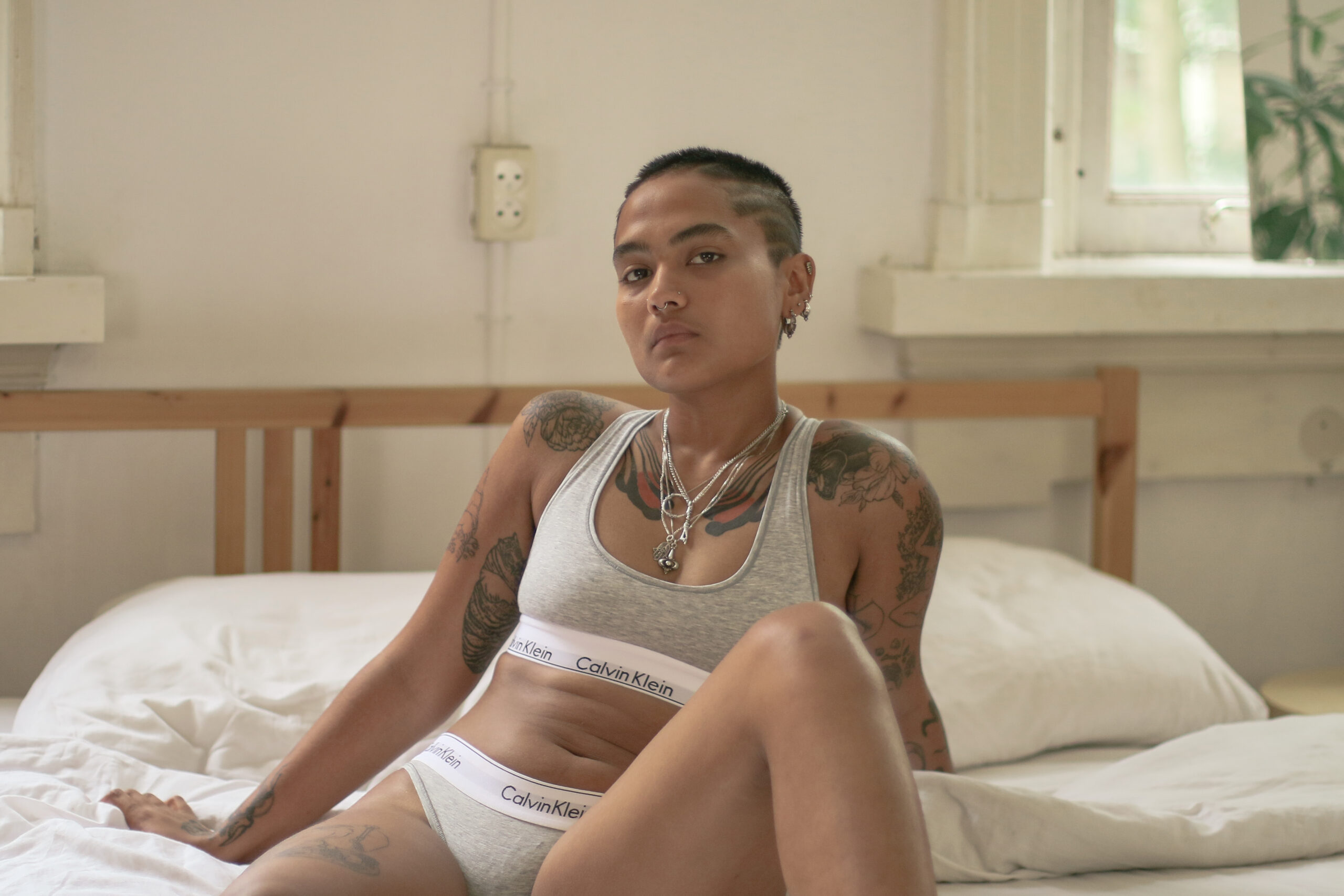
Recalling her experience in connecting with her queer identity, Naqvi explained how the point of reference—for most queer people when they reclaim their identities—is met by disdain and more trauma, especially for queer people of colour. “It was for me too—but there were glimpses of light in all conversations that were otherwise too heavy to carry, which have now brought me to the place I am with myself today.”
“In that rare conversation with my family about queerness, in explaining to them in the sweetest of words what it meant, at that moment I saw myself also redefining the terms of my own existence for the first time.”
According to the artist, “how we assert our boundaries from the cis-heteronormative ideas of being will also come from places across the world and from how they paint their own narratives of becoming.” Although we all share this rock floating through space, the Earth is a multifaceted and diverse place and it continues to change, as Naqvi highlighted. “Cultures that are incredibly queer but don’t have to call themselves such, we are now on a path to realise the decentralisation of the west, decolonise our ideas of expression and beauty and thus the conversations I had with my parents about identity and queerness felt so instrumental in understanding who I want to be.”
Dafne Boggeri, Artist (she/her)
‘Coming out of my Comfort Zone’ in Milan (Via Gaetano de Castillia 24 as of 5 September)
Multidisciplinary artist Dafne Boggeri is the curator of an independent publisher and member of the female and non-binary collective group Tomboys Don’t Cry. Her mural features a pattern formed by masks that represent stylised Greek mythological figures of Melpomene (muse of tragedy) and Thàlia (muse of comedy). The masks create a type of camouflage that forces those who want to grasp the entirety of the message to make an effort. The colour purple was specifically selected for its relations to the LGBTQ+ movements of the 1970s.
Boggeri described her own queer identity as a “fever” which lead her to strive to “always consider other points of view in reality—its hierarchies, more or less artificial, in which places, objects, emotions and stories can always be observed from another point of view, to be overturned and give us a new way of perceiving them.” She highlighted how this constant sense of otherness is intertwined with her work and accompanies all her creative practices—from installations and performances to DJ sets and spray-painting trains at the age of fifteen.
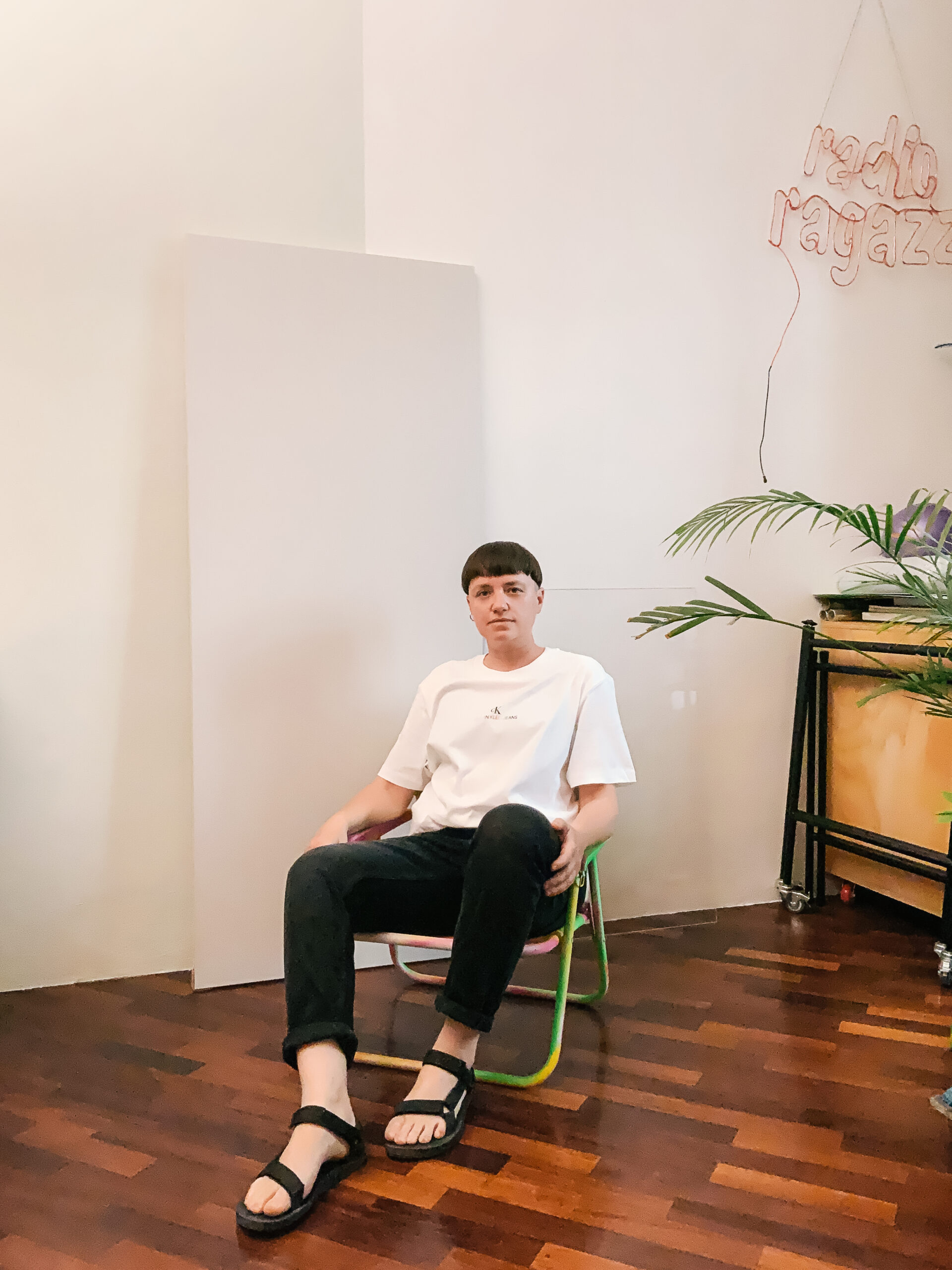
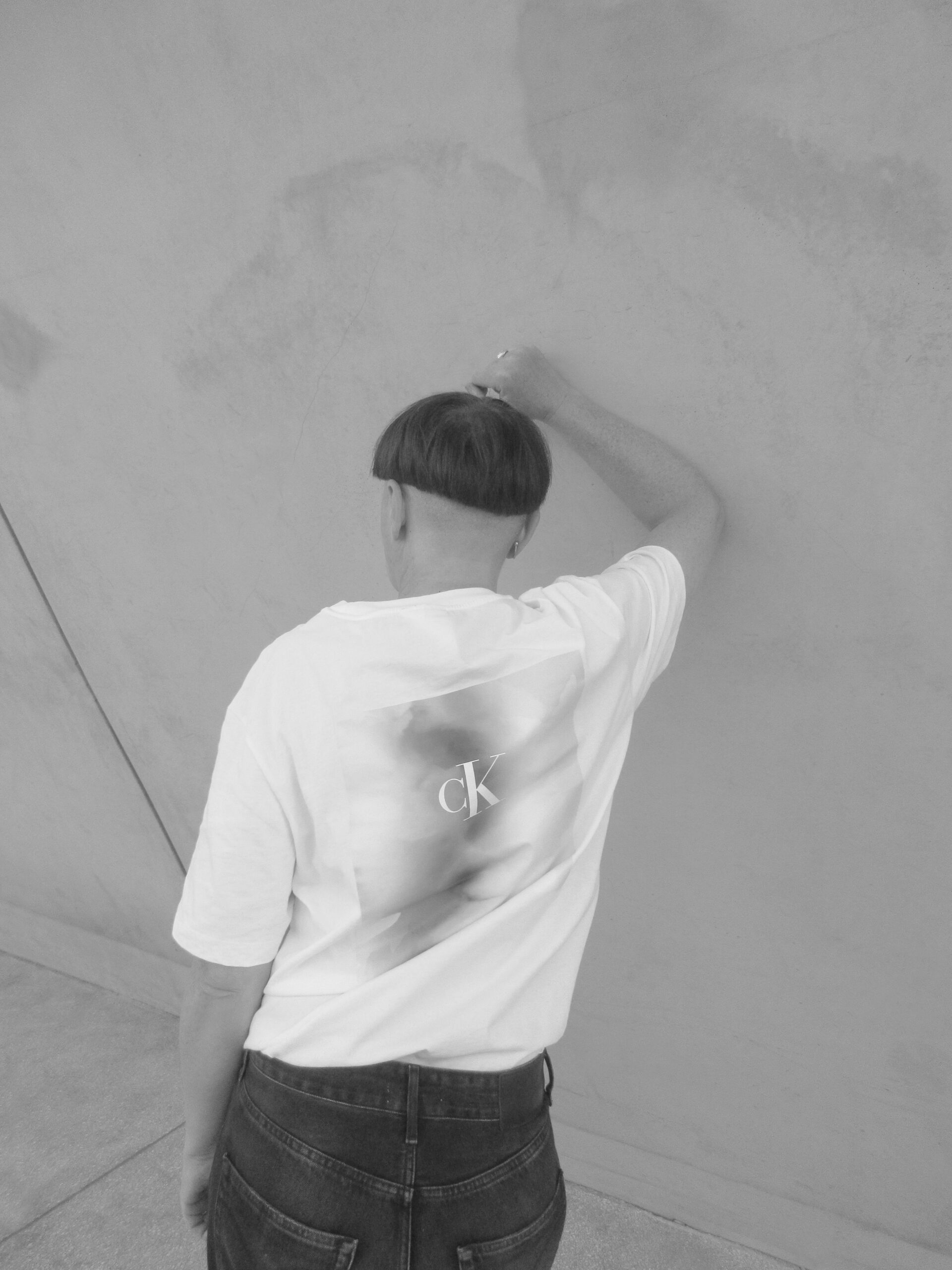
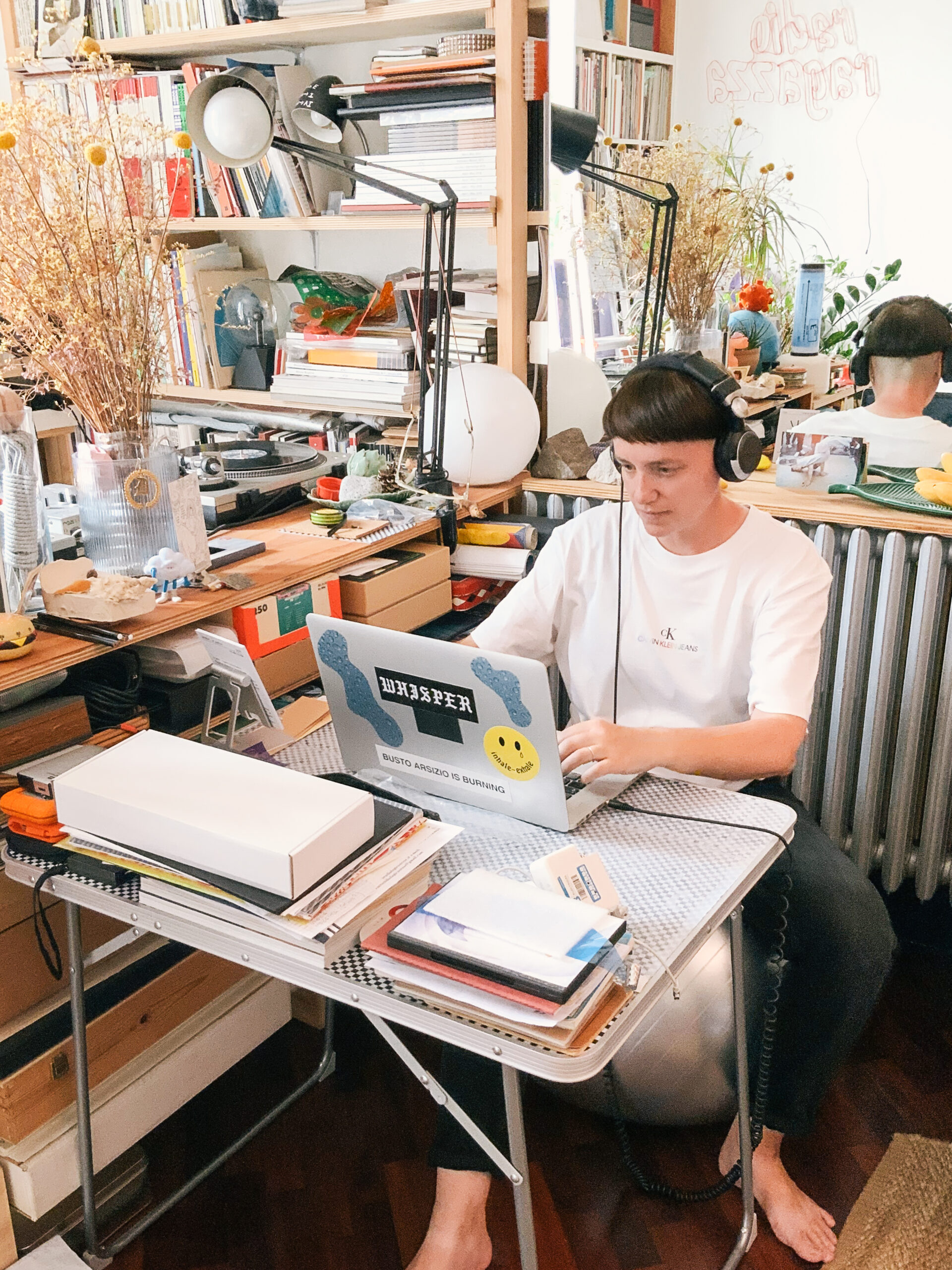
“When I came out of my comfort zone. The moment in which anything could happen. Taking the risk…”
When Boggeri came out of her comfort zone and embraced her queer identity, she knew anything could happen, a moment which she described as “taking the risk.” This experience is partly what drove the inspiration behind her mural piece in Milan. “I wanted to bring out a potential condition that all people can share in their own way, in a very personal perspective, each with respect to their lifestyle and habits. We can commonly identify the ‘comfort’ as a series of more or less habitual characteristics, related to our personality, and our living conditions, which can accompany our lives with positive connotations.”
At the same time, however, Boggeri believes that if these habits are repeated too much, they can also lead to widespread addiction and a progressive loss of empathy and confrontation. “With that dimension of discovery and the unexpected that can make us find outsides of our being that we did not know, through which we can expand our knowledge not only in terms of notions but also in a position of listening to what is more or less visible around us,” she said.
In addition to this ‘cosmic’ meaning, as Boggeri herself describes it, there is also a more local and personal connotation attached to the piece. The mural, situated in Porta Nuova is an “area of accelerated gentrification, full of contradictions and a strange widespread narrative that accompanies its evolution, with words that do not correspond to the reality of the facts, much more problematic than it seems.”
Danielle Brathwaite-Shirley, Archival Activist (they/them)
‘There is Power in not Passing’ in Berlin (Warschauerstrasse 9 as of 5 August)
Multimedia archival artist Danielle Brathwaite-Shirley seeks to create art that archives the black trans experience. Bright in its colour and energy, Brathwaite-Shirley’s mural celebrates togetherness, unity and pride. It captures the moment when they signed their chosen name into law. “It felt as though for the first time I saw who I was becoming,” they recalled. “These figures are within metamorphosis and showcase the transition into our new selves visually.”
Brathwaite-Shirley identifies as black and trans, emphasising the importance of needing to archive the lives of others like them through their practice as an archival activist. “Archives have historically erased us. Kept us hidden or recorded us in the same violent ways that erased us in the first place. The work I make stands as an archive of the black trans people I encounter.” On BlackTransarchive.com, Brathwaite-Shirley archives the dreams and desires of black trans people—making an archive that centred them but also requires the audience to input their own identity to access it.
They noted, “I make my work for others like me so usually throughout the work I make a point to decentre every other audience. If you are not black and trans you will not have access to everything in the work. Everything isn’t for you, it’s for us.”
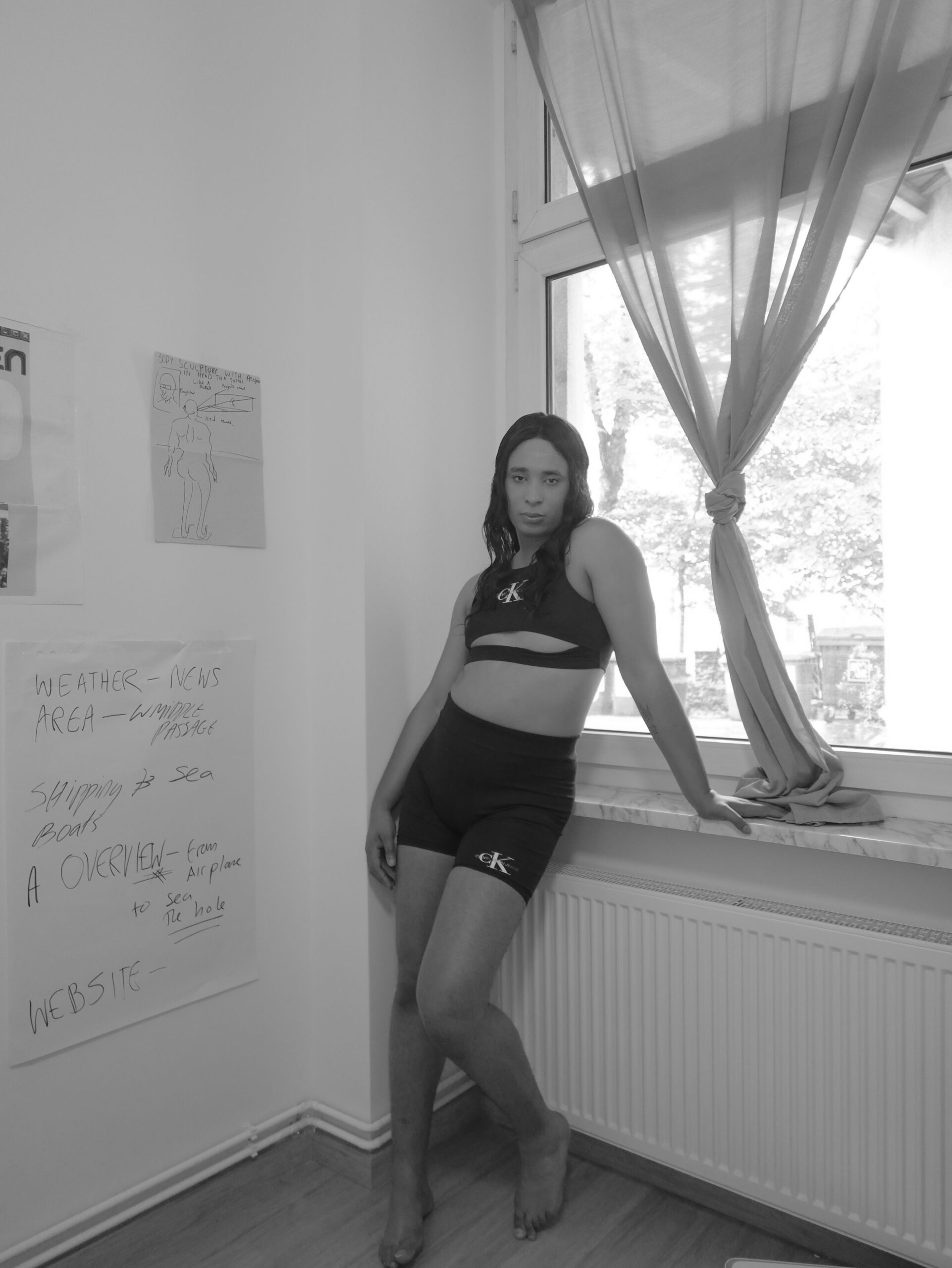
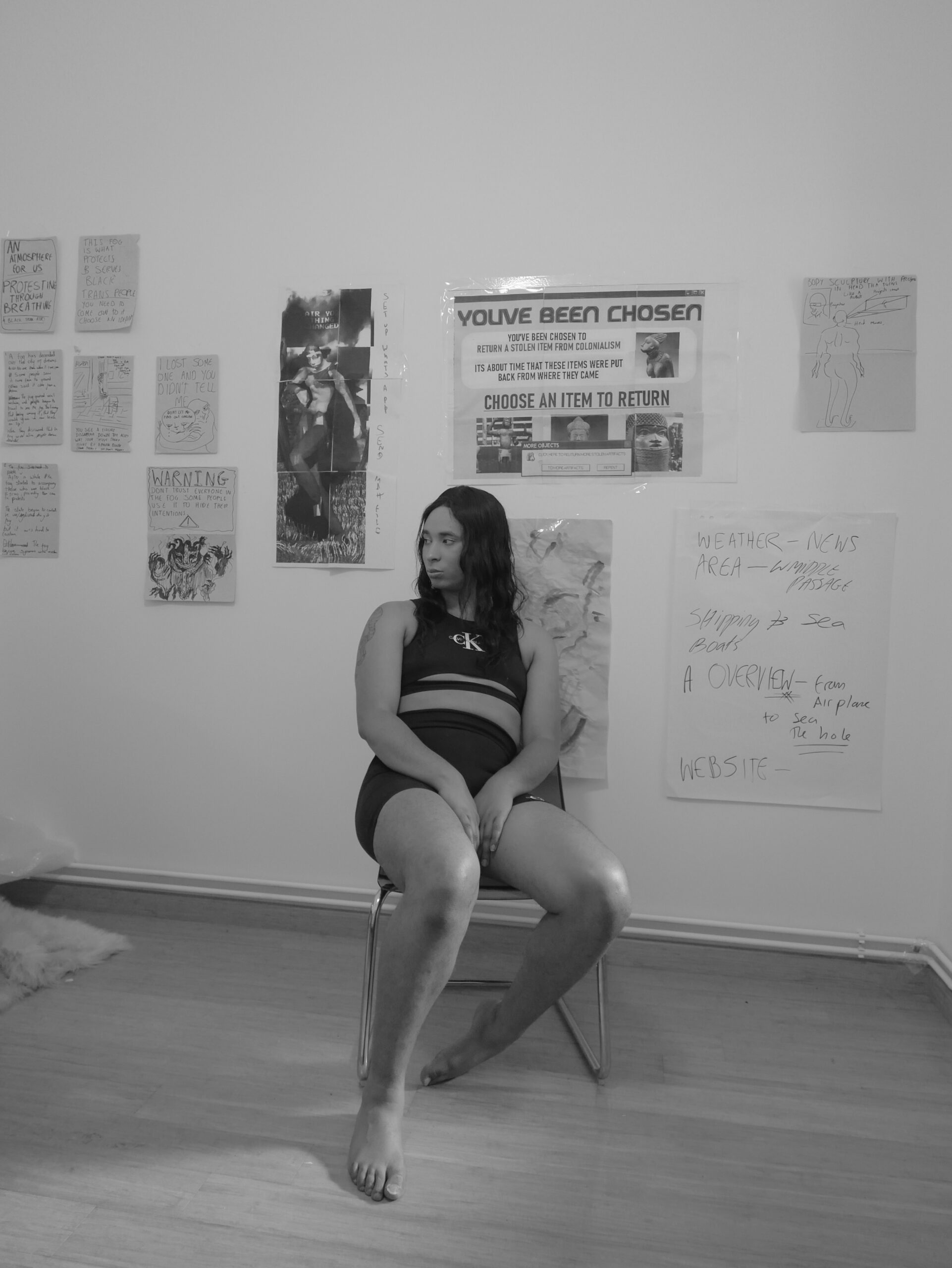
“In the moment when we signed my chosen name into law with my family around me, for the first time I saw who was becoming—that there is power in being visibly trans.”
Brathwaite-Shirley described that their pinnacle moment in connecting was when they formally changed their own name. Before that moment, they highlight how “various factors” kept them “in the dark, afraid to make the major moves” to recognise their true identity.
However, the archival activist was fortunate to have others around them who were supportive. They explained, “Those around me had seen who I was, seen what I needed to do and were ready to put in the work to make what I needed happen. At the opening of one of my shows, they had prepared a deed poll, with signatures on it patiently waiting for mine to legally change my name. This would be the first official step I would have taken to becoming myself. I couldn’t believe that in a moment of weakness my chosen family had shown their strength to push me towards accepting who I was every day. That I shouldn’t fight, and instead, relish in who I was becoming—who I had always been.”
Brathwaite-Shirley has translated this very moment into a visual presentation in their mural, captured through three figures in the image. They explained, “on signing a deed poll I needed signatures from two people to witness me changing my name as well. I am represented in the middle supported by those that cared for me standing on either side of me. Holding me up. All of us don’t look quite human as we do not need to meet any expected standard of presenting. We present ourselves health together by our joint experiences that bring us together.”
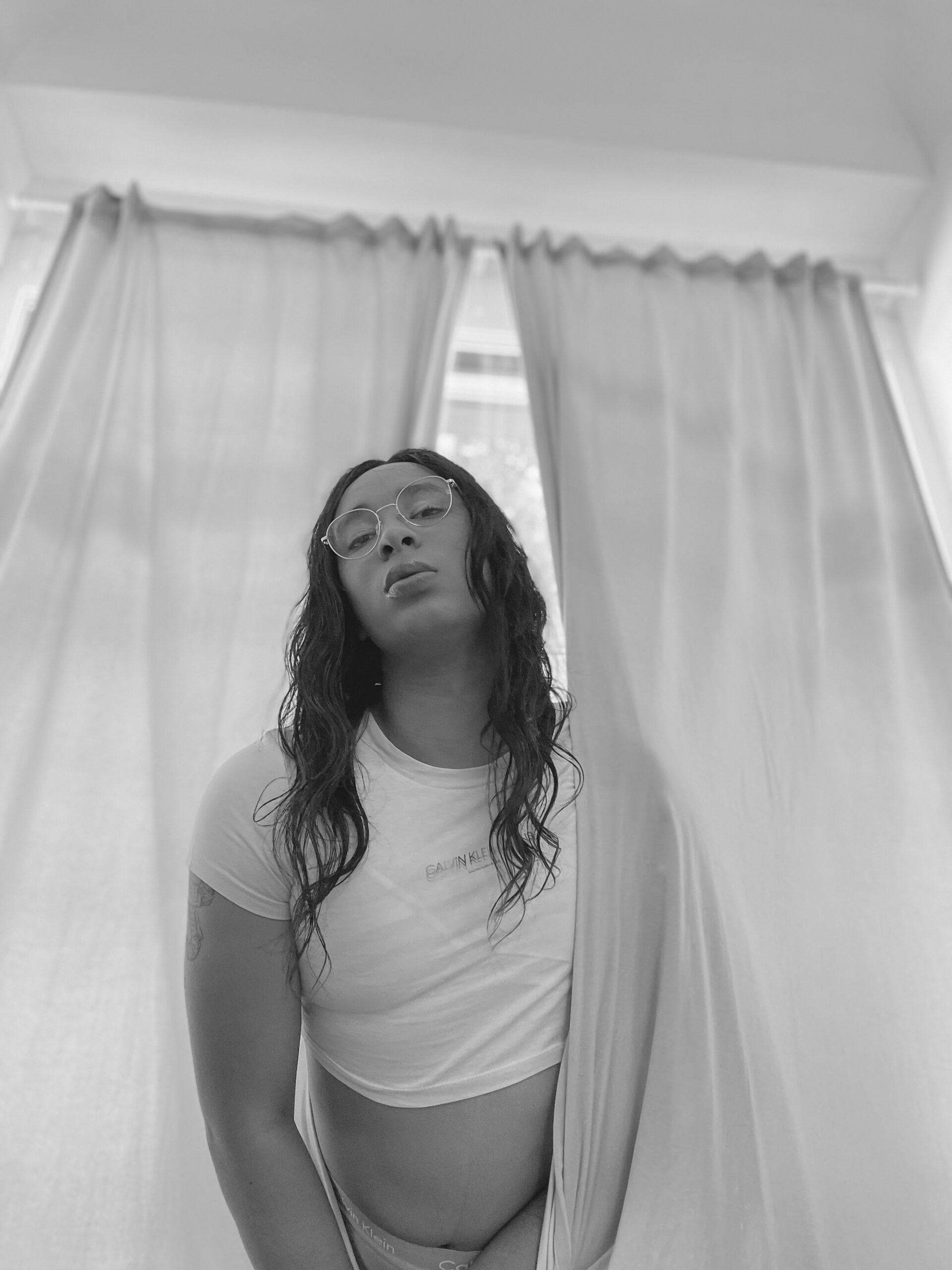
They added how the idea of translating such an experience began with creating an image that represented a larger group of people, lifting up a figure made of the words ‘BLACK TRANS BODY’. “The more I worked on it the more I thought about those who had been there, those who put their work in to hold me up, those who held me up no matter the circumstance. This slowly shifted from an image of power to an image of tender care and intimacy, showing the affection between each other that we need to keep us afloat.”
As a queer core team, IoDF acknowledges the authentic meaning of Pride, plus the importance of celebrating the community and giving marginalised voices a platform to share not just their artistic practices, but build a discourse. “An important part of our work at IoDF is to push for change, advocating for a more inclusive and diverse future for all,” said Leanne Elliott Young & Cattytay, co-founders of IoDF. “Supporting Calvin Klein in the curation of this queer narrative—for our queer community during Pride—is a pivotal moment for IoDF, allowing us to showcase the sheer talent and experiences of each of the icons.”
Murals of Pride is an extension of Calvin Klein’s ongoing support for Pride and LGTBQIA+ communities through its dedicated #ProudInMyCalvins campaigns. The company also partners with multiple non-profit organisations in support of LGBTQIA+ advocacy, equality and safety, including The Trevor Project, ILGA World, the Transgender Legal Defense & Education Fund, the National Pulse Memorial & Museum and BlaQ Aboriginal Corporation.
Credits
Featured talent
Tanaka Fuego
Photographed by
Dashti Jahfar
Featured talent
Sarah Naqvi
Photographed by
Sophie Soobramanien
Featured talent
Dafne Boggeri
Photographed by
Cory VC
Featured talent
Danielle Brathwaite-Shirley
Photographed by
Samuel Smelty






